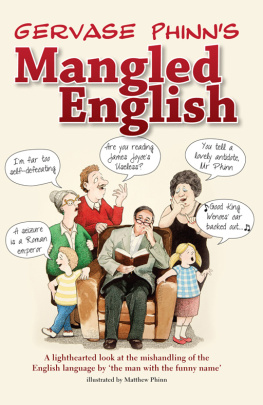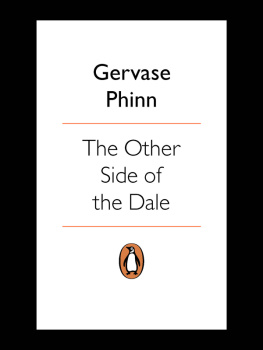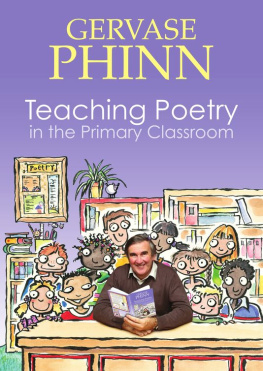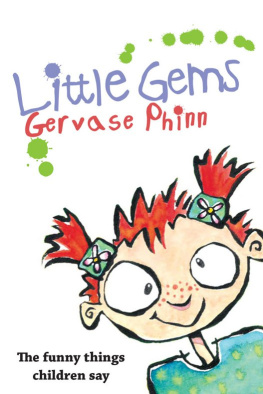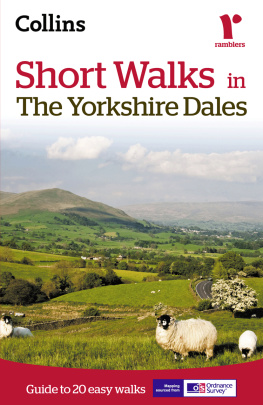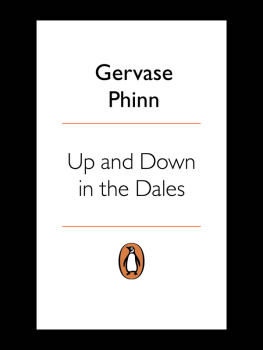By the same author
THE DALES SERIES
The Other Side of the Dale
Over Hill and Dale
Head Over Heels in the Dales
Up and Down in the Dales
The Heart of the Dales
A Wayne in a Manger
Twinkle, Twinkle, Little Stars
A Load of Old Tripe
POETRY
published by Puffin Books
It Takes One to Know One
The Day Our Teacher Went Batty
Family Phantoms
Don't Tell the Teacher
PENGUIN QUICK READS
All These Lonely People
Road to the Dales
The Story of a Yorkshire Lad
GERVASE PHINN
MICHAEL JOSEPH
an imprint of
PENGUIN BOOKS
MICHAEL JOSEPH
Published by the Penguin Group
Penguin Books Ltd, 80 Strand, London WC2R 0RL , England
Penguin Group (USA) Inc., 375 Hudson Street, New York, New York 10014, USA
Penguin Group (Canada), 90 Eglinton Avenue East, Suite 700, Toronto, Ontario, Canada M4P 2Y3
(a division of Pearson Penguin Canada Inc.)
Penguin Ireland, 25 St Stephen's Green, Dublin 2, Ireland (a division of Penguin Books Ltd)
Penguin Group (Australia), 250 Camberwell Road,
Camberwell, Victoria 3124, Australia (a division of Pearson Australia Group Pty Ltd)
Penguin Books India Pvt Ltd, 11 Community Centre,
Panchsheel Park, New Delhi - 110 017, India
Penguin Group (NZ), 67 Apollo Drive, Rosedale, North Shore 0632, New Zealand
(a division of Pearson New Zealand Ltd)
Penguin Books (South Africa) (Pty) Ltd, 24 Sturdee Avenue,
Rosebank, Johannesburg 2196, South Africa
Penguin Books Ltd, Registered Offices: 80 Strand, London WC2R 0RL , England
www.penguin.com
First published 2010
Copyright (c) Gervase Phinn, 2010 2010
'Burnt Norton' from Four Quartets by T. S. Eliot, reproduced by permission of Faber and Faber Ltd and in the USA copyright 1936 by Harcourt, Inc. and renewed 1984 by T. S. Eliot, reproduced by permission of the publisher Houghton Miffin Harcourt Publishing Company 'Dreamboat' lyric reprinted by permission of Winston Music Publishers (c) (r) 1982 ASCAP
The moral right of the author has been asserted
Every effort has been made to trace copyright holders and to obtain their permission for the use of copyright material. The publisher apologizes for any errors or omissions and would be grateful to be notified of any corrections that should be incorporated into future editions of this book.
All rights reserved
Without limiting the rights under copyright reserved above, no part of this publication may be reproduced, stored in or introduced into a retrieval system, or transmitted, in any form or by any means (electronic, mechanical, photocopying, recording or otherwise), without the prior written permission of both the copyright owner and the above publisher of this book
ISBN: 978-0-14-196463-8
Contents
For my parents, Pat and Jimmy Phinn,
who allowed me to dream
Acknowledgements
I am grateful to my wife and family for their continued support, and to my editor, Lindsey Evans, who has been exceptionally wise and patient throughout.
When I was a Boy
When I was a boy:
My bunk bed was a pirate ship
That sailed the seven seas,
My sheets they were the silvery sails
That fluttered in the breeze.
I'd dream of clashing cutlasses
And the crack, crack, crack of the gun
And the boom, boom, boom of the cannons
And the heat of the tropical sun.
I'd dream of far-off oceans
And treasure by the ton,
And mountainous waves
And watery graves
And islands in the sun.
Foreword
Footfalls echo in the memory
Down the passage which we did not take
Towards the door we never opened
Into the rose-garden. My words echo
Thus, in your mind.
- T. S. Eliot, Four Quartets
T. H. ('Taffy') Williams, headmaster of South Grove Secondary Modern School, stood on the stage in the school hall. He was a striking-looking figure: tall, lean, straight-backed, with short silver-white hair neatly parted, dark Celtic complexion and those pale blue all-seeing eyes. It was the leavers' assembly.
'Today, you will be leaving,' he said in that deep, resonant Welsh valley voice of his. 'Today, you will walk down the top corridor of the school for the last time, past the row of classroom doors through which you have entered many, many times over the last four or five years, and you will go out into the wide world beyond. Some of you will start work and leave behind the complexities of English grammar and the frustrations of algebra and trigonometry, the dates in British history and the maps of far-off countries, and you may well be heartily glad of that. Some of you have chosen to continue your studies and move on to A levels and maybe college or university. But whoever you are and whatever you do, as you walk down that corridor for the last time, I want you to pause for a moment and remember one thing: life is like that corridor, lined with many different doors. Some will be bolted and barred and however hard you push and pull, strike and shout they will remain forever closed to you. Some will be wide open and you will walk through with little effort and no hindrance. Some will be ajar, and with a little exertion and curiosity, you will be able to see what lies behind. Most doors, however, will be closed - but they will seldom be locked. These are the doors of opportunity, boys. The doors of opportunity. It is up to you which of these closed doors you choose to try, and to discover what is behind, waiting for you -' he paused for effect - 'and which to pass on by.'
I guess for many of the pupils in the school hall that heady July morning the headmaster's metaphor was lost upon them, but for me, an ambitious, rather studious, idealistic sixteen-year-old, those words have remained a vivid memory. The closed doors in my own life have been rarely, if ever, locked and I have been immensely fortunate that I have had caring, supportive, encouraging people all along the way who have helped me through them.
I should say from the start that this account of my early life is no misery memoir. It will not stand on the bookshop shelf under the heading 'Tragic Life Stories' along with the heart-rending autobiographies of unbelievably unhappy childhoods - nightmare families, loveless homes, brutal parents - all described in vivid detail; of children beaten and starved, rejected and abused, bullied and tortured. Such accounts, where the authors describe how they have overcome the huge disadvantages of miserable upbringings, have become instant best-sellers and the reading public appears to love them. Perhaps in doing so the readers' own lives seem less wretched and more bearable. Perhaps they are heartened by these sad stories of children who have a shining spirit to survive, cope and forgive. For me, such memoirs are painful to read, for mine was a very happy childhood. I did not suffer from great poverty as a child, nor was I born into an affluent and privileged home. I was not smacked or told I was unwanted. I was not bullied by my brothers or told by my parents I was a disappointment to them. I felt loved and cherished.
My journey through childhood was neither a painful nor a shameful one. It was blessedly free of poverty, neglect, cruelty and exploitation and I have many fond memories. I have never subscribed to the prevalent view that childhood is simply a stage on a road to adulthood, something to be got through on the way to something better, and, unlike some writers of the many memoirs and autobiographies I have read, I have never sought to distance myself from it or to negate it. Indeed my childhood has acted as an inspiration for the present and the future, a place to which I sometimes escape, where I can, in a sense, avoid growing up.
Next page

